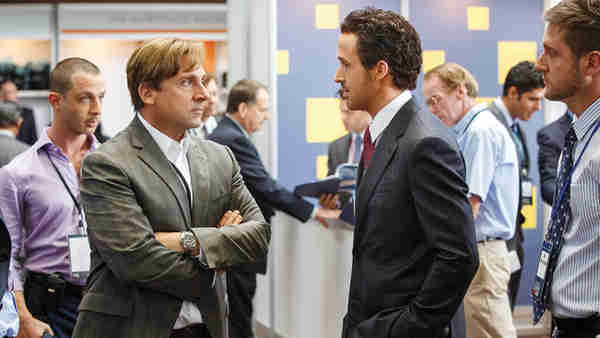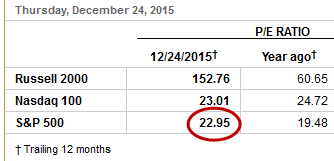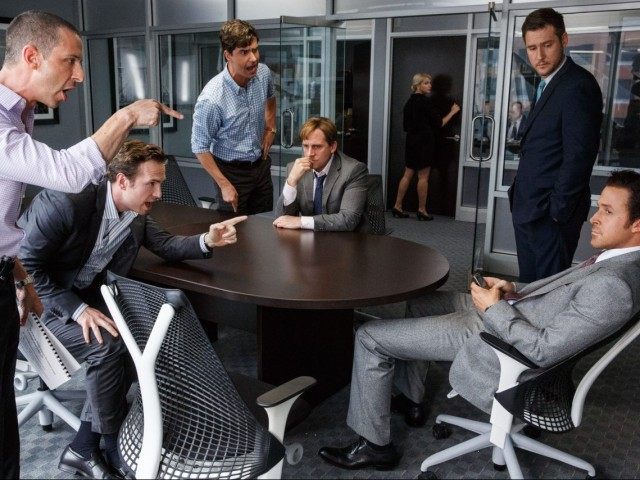
The Big Short
I saw the movie “The Big Short” yesterday (Christmas), and found myself becoming increasingly upset and infuriated as it went along.
The movie is a description of the financial crisis, based on Michael Lewis’s bestselling book “The Big Short: Inside the Doomsday Machine.”
The main characters are money managers Michael Burry (Christian Bale) and Mark Baum (Steve Carell), who foresaw the crisis and found ways to make over a billion dollars profit from it. They foresaw that the housing market and the supporting subprime mortgages were going to crash, and they found a way, using credit default swaps, to bet that the housing market would crash, and they won.
Along with them is a supporting cast of stupid, sleazy bankers and real estate brokers who sold subprime mortgages, created the fraudulent subprime mortgaged backed synthetic securities, and defrauded investors.
In many ways the movie is a comedy because the material is presented in a clever way. For example, the movie might cut to a girl taking a bubble bath who looks into the camera and describes a type of investment; or to a chef who chops up three-day-old fish (representing rancid investments) and throws them into a pot to make fish stew (representing collateralized debt obligations or CDOs). A lot of the movie takes place in Las Vegas, so there are a lot of pretty semi-dressed girls as backdrop. The purpose was to make this super-dry financial stuff interesting enough to make it interesting to the audience. Those who see the movie and want to understand the mathematics behind CDOs and credit default swaps can read my January 2008 article, “A primer on financial engineering and structured finance”.
In the movie, Baum spoke to mortgage consultants who bragged about selling huge subprime mortgages to people with no jobs, no income, and absolutely no chance of meeting the mortgage payments. The bank lends the money for the interest-only mortgage and the banker gets a huge commission; the mortgage consultant gets a huge commission; the mortgagor gets to move into his new house, and will stay there until the interest-only period ends, and then he gets evicted and screwed. The total immorality of the mortgage consultants and bankers, bragging how they screwed people, is clear.
Baum visited a stripper who had gotten a mortgage through the consultants. He had to pay her fee for an hour of her time in order to interview her. He told her that her mortgage payment would soon double or triple. After learning that, she was no longer pretty.
Baum went to Florida and found developments with hundreds of houses, almost all abandoned because the owners had been foreclosed. The few people left looked like they were staring death in the face.
Baum also visited a money manager who had merged thousands of faulty subprime mortgages, knowing that they would default, and created the CDOs and CDOs-squared other fraudulent securities that he sold to investors as AAA investments.
Baum visited someone at the S&P Rating Service to ask why the synthetic bonds were still rated AAA, even after large numbers of subprime mortgages had gone into default. He was told that the banks had paid them to give them the AAA rating, and that if they refused, the bank would go to Moody’s, a competitor. In other words, the S&P Rating Service did not actually rate the fraudulent bonds; they simply gave an AAA rating because they were paid by the bank to do so.
I saw all this stuff going on and I became angrier and angrier. As long-time readers know, I have been writing about the housing bubble since 2004, and how it was going to cause a financial crisis. (From July 2004: “Real estate is in an overpriced bubble all over the world”) I have been angry for years about what was going on, and what this movie did is bring back all that upset and anger in one huge clump. (Don’t worry. I didn’t go ballistic, but fumed in silence.)
And there were so many levels on which this movie infuriated me.
First, this movie was full of crooks, some of whom made thousands and other who made hundreds of millions — on the backs of families who lost their homes and jobs and went bankrupt. But now, in 2015, not one goddamn one of them has even been prosecuted and sent to jail.
The Obama Justice Department has adamantly refused to prosecute anyone, because they all used a portion of their fraudulently obtained millions to make large contributions to the Obama campaign or projects sponsored by Obama. Not one single person has been prosecuted. They are all in the same jobs, able to find new ways to defraud people — as we’ve seen in the Libor and Forex scandals — and continue to pay off the Washington politicians.
Prior to the 2000s, I would never have believed that this massive level of corruption and criminality was possible in the United States. Maybe in Russia, maybe in China, but not in the United States. It was only made possible with the rise of Generation-X in the 2000s.
The second infuriating thing is that so many mainstream economists and bank managers and politicians claim they never saw the financial crisis coming. They did not even know there was a housing bubble until well after the financial crisis began.
And my question, the one that I have asked myself over and over for years, is: If none of these people knew that there was a housing bubble, then how the frigging hell did I know it in 2004? And why, year after year, did people I tried to explain it to treat me as a pariah? (Yes, this has gotten very personal for me.)
The fact is that I have concluded long ago that they were not caught by surprise at all. The Gen-Xers who created the fraudulent synthetic securities had by and large graduated with Masters degrees in Financial Engineering in the 1990s. Many Gen-Xers (including Obama himself) were children of divorce and hated their fathers and their fathers’ generation. There are huge amounts of stuff on the internet about this. So when the Nasdaq crash occurred in 2000, they blamed it on their fathers’ generation, and purposely sold them fraudulent securities to get even with them.
What about the bank CEO and other top-level bank managers. Did they know that they were defrauding the public?
Yes of course they did, and I’ll explain why. In April 2010, Congress interviewed numerous financial executives, including former Citigroup CEO Charles Prince and former Citigroup Chairman Robert Rubin, who was also the Treasury secretary in the Clinton administration. (See my April 2010 article: “Financial Crisis Inquiry hearings provide ‘smoking gun’ evidence of widespread criminal fraud”)
Based on the testimony, the Committee concluded that these banks had made investment claims that were mathematically impossible. In brief, they had taken B and C rated securities, sliced and diced them into CDOs, and came up with AAA rated securities with the same nominal value, which is mathematically impossible. Commission member Byron Georgiou said:
Yesterday I likened it to the medieval alchemy, and today, as I study it more, I’m beginning to believe that maybe it was hallucinatory.
Georgiou went on to summarize the “smoking gun” figures that proved that fraud was committed, and that Charles Prince and Robert Rubin must have known this. Prince and Rubin could not have understood the mathematics behind the creation of the synthetic securities created by Masters of Financial Engineering, but they certainly must have known that when B-rated securities are turning into AAA-rated securities of the same nominal value, then something illegal must be going on. In other words, the Committee proved that Charles Prince and Robert Rubin had committed criminal fraud, and that they should be prosecuted and, if convicted, sent to jail.
After I wrote the 2010 article on the Commission hearings, I waited for the investigations and prosecutions to begin. And of course they never did. It was too lucrative for the Obama administration, who needed those campaign contributions for the 2012 reelection campaign. So all the criminals are still walking the streets or, more likely, at their jobs criminally defrauding more people.
Going back to “The Big Short” movie now, the movie does not attempt to sugar coat what happened. Although the movie does not name names of bankster criminals, Baum and the others repeatedly make it clear that these bankers and politicians know they’re committing fraud, and they are going to do nothing about it. In fact, probably the most depressing moment for Baum in the movie is when he realizes that the Justice Department is not only not going to prosecute these criminal bankers, but is going to go further and bail them out with taxpayer money, rewarding these crooks for their criminality.

S&P 500 Price/Earnings ratio at 22.95 on December 24, indicating a huge stock market bubble (WSJ)
The end of the movie also makes clear what I have been saying for years: That crisis is far from over, and there is going to be a new round of job loss, homelessness, and financial ruin for millions of people.
As I have repeated many times, Generational Dynamics predicts that we are headed for a global financial panic and crisis. According to Friday’s Wall Street Journal, the S&P 500 Price/Earnings index (stock valuations index) on Friday morning (December 24) was at an astronomically high 22.95. This is far above the historical average of 14, indicating that the stock market is in a huge bubble that could burst at any time. Generational Dynamics predicts that the P/E ratio will fall to the 5-6 range or lower, which is where it was as recently as 1982, resulting in a Dow Jones Industrial Average of 3000 or lower.
This brings me to the final reason why this movie so infuriated and upset me, and this is extremely personal. As I said, I knew in 2004 that there was a housing bubble, and I wrote about it many times. Other people (such as Baum in the movie) figured it out and were able to make millions of dollars, but all I get for getting it right is to be treated as a pariah. My web site, using generational analysis, has for years correctly predicted what would happen in the Mideast, in Afghanistan, in Russia, in China, and so forth. There is no web site or analyst or journalist in the world with anything like the predictive and analytical success of my web site. But not only is this apparently not of value to anyone, but it’s brought me nothing but misery, as I’m hated and shunned by many people, in some cases even people I’ve known for years.
My story is the story of the mythical Cassandra. After her predictions all came true and Troy was massacred, Cassandra was raped and assaulted. My only hope is that when everything that Generational Dynamics predicts comes true, my demise will be a lot quicker and a lot less painful. For me, that’s the lesson of “The Big Short.” Variety and USA Today
KEYS: Generational Dynamics, The Big Short, Charles Prince, Robert Rubin, Byron Georgiou, Cassandra
Permanent web link to this article
Receive daily World View columns by e-mail

COMMENTS
Please let us know if you're having issues with commenting.